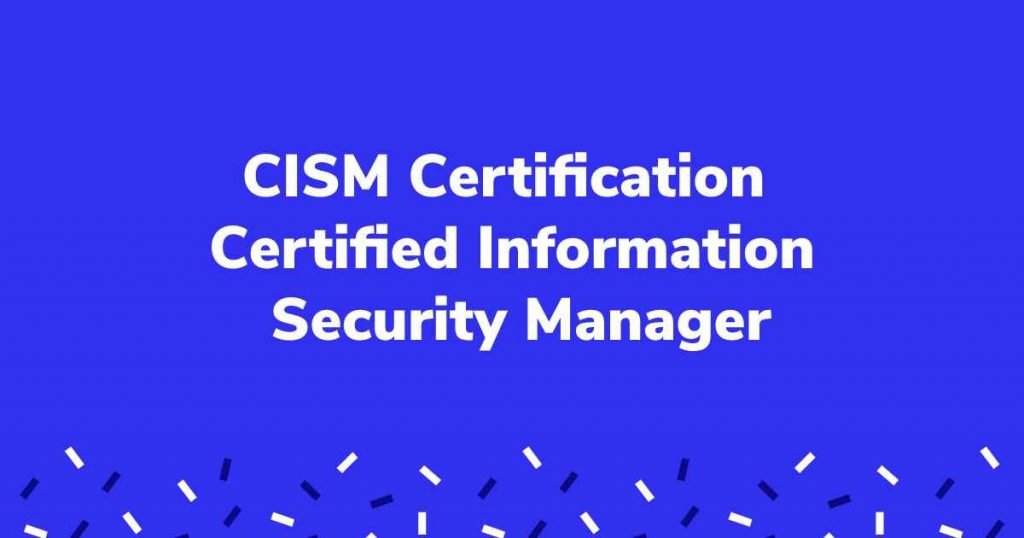CISM Certification: The Certified Information Security Manager (CISM) certification from ISACA certifies a person’s knowledge of information security governance, programme development and management, incident management, and risk management. Take your career out of the area of technology and into the sphere of management!
The Certified Information Security Manager (CISM) certification from ISACA is for people who wish to advance from team player to manager and have technical competence and experience in IS/IT security and control. CISM can help you build trust and credibility with internal and external stakeholders, peers, and regulators.
CISM Course Curriculum
- Information security governance – 24%
- Information risk management and compliance – 33%
- Information security program development and management – 25%
- Information security incident management – 18%
CISM Course Course Description
Candidates can earn the CISM certification by taking the Certified Information Security Manager (CISM) course. The Information Systems Audit and Control Association (ISACA) offers the certification to evaluate applicants’ skills and knowledge of the relationship between an information security programme and larger business objectives. The certification also verifies that the candidate has practical experience establishing, managing, and implementing an organization’s information security programme.
ISACA’s CISM certification is for experienced information security management professionals who have worked in the development and management of information security programmes.
The four domains of the CISM certification exam are covered in the CISM course. Students pursuing CISM certification, as well as IT security and information security professionals eager to expand their practical expertise, can benefit from this course.
What is CISM exam eligibility criteria?
Candidates for the CISM certification must follow ISACA’s Code of Professional Ethics and have five years of experience working in the field of information security. Work experience must be obtained within 10 years before the certification application deadline or within five years of passing the exam for the first time. Three of the five years of work experience must be in the capacity of an information security manager.
OBJECTIVES OF CISM CERTIFICATION COURSE
- Learn about the roles, functions, resources, goals, strategies, measurements, and controls that go into information security and risk management.
- Learn how a business may identify and analyse risk, as well as the risks that risk management faces.
- Learn how to create a risk management action plan and why people and processes are so important in risk management.
- Learn about risk management training, technical components, and standards.
- Understanding how to monitor and quantify risk, as well as how to use controls to reduce risk
- Learn how to define goals and strategies for information security management, as well as the metrics that are used to assess security performance.
- Acquire a thorough grasp of security incident management, develop goals for responding to occurrences, and become familiar with the additional resources available to assist with incident management.
Common WordPress Error
- How to fix 403 forbidden error in WordPress?
- How to Fix 404 Error After Plugin Update?
- How to fix http error 503?
- 3 Easy Steps to add Google Analytics event tracking?
Benefits of cism certification
Salary increase
A CISM certification, like other information security certifications, can help you advance in your career. According to Certification Magazine, 48 percent of information security workers who earned the CISM certification saw a pay raise within a year of earning it. While 68 percent of those polled stated their raise was less than 5%, around 25% received a raise of 20-25 percent. The rest of the group had greater numbers.
Furthermore, the average CISM pay looks to be the highest among the 12 certifications, at $127,063. At $117,030, the CISSP comes in second.
More credibility
Because organisations are having a difficult time finding skilled professionals, CISM certification is a wonderful way to see if a candidate has the necessary knowledge and experience. A CISM certification, on the other hand, is not always a guarantee that a candidate for an information security management job would be successful in the long run.
More knowledge
Perhaps the most valuable benefit that CISM certification can deliver to CISM holders is a common grasp of key topics. Individuals who have earned the CISM certification have a thorough understanding of their companies’ operations. They can see problems and change company operations to accommodate information technology management.
FAQs
How do I keep my CIMS certification current?
The following are the prerequisites for keeping your CISM certification current. Maintain an acceptable level of knowledge and skill in the management of information systems security.
1- Every year, complete 20 CPE hours.
2- The ISACA Code of Professional Ethics should be followed.
What are the prerequisites for CISM certification?
The exam is not open to all IT professionals. A candidate for CISM certification must have at least 5 years of experience in information security, with at least 3 years of experience in information security management in three or more of the CISM domains listed above. Furthermore, the experience must have been obtained within the last 10 years before the application deadline or within the last 5 years after passing the exam.
After completing the exam, candidates have five years to apply for CISM certification.
What is the CISM exam pattern?
A 150-question multiple-choice exam is the first step in the CISM certification process. The CISM passing score is 450, and the exam is graded on a range of 200 to 800. The test examines the following four CISM domains or content areas:
1- Information security management
2- Management of information risk
3- Development and management of information security programmes
4- Management of information security incidents
